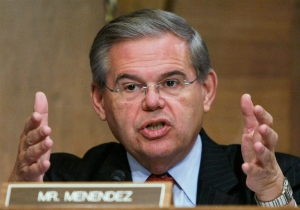 (Reuters) - Senator Robert Menendez is happy to play the role of a U.S. "bad cop" on Iran. Just don't call him a warmonger.
(Reuters) - Senator Robert Menendez is happy to play the role of a U.S. "bad cop" on Iran. Just don't call him a warmonger.
The Democratic chairman of the influential Senate Foreign Relations Committee upset the White House by leading the push for a bill that would tighten sanctions even further on Tehran, potentially putting at risk nuclear talks between world powers and the Islamic Republic.
Still, his hard line on Iran has its uses in the negotiations.
Congressional hawks like Menendez have allowed "good cop" Obama administration negotiators to remind Iran that Congress is ready to impose more sanctions if talks do not go well.
"I think that we have been a positive force on getting Iran to this moment, and I think the administration actually has worked away with the best of all worlds," Menendez told Reuters in a telephone interview.
"We have the same end goal. We have at the moment a difference in tactics," the New Jersey Democrat said.
President Barack Obama threatened to veto the sanctions bill if it passed, and it has now stalled in the Senate. The administration will still need allies in Congress, including Menendez, as diplomats hammer out a final nuclear agreement.
While they have no problem playing Obama's foil on Iran, Menendez and other senators bristled when a White House aide publicly accused them last month of warmongering.
"If certain members of Congress want the United States to take military action, they should be upfront with the American public and say so," Bernadette Meehan, a spokeswoman for the National Security Council, said in a statement.
Her comment was an unusually strong denunciation of members of the same party as the president. It landed with a thud on Capitol Hill.
"It was unfortunate to have spokespeople for the administration suggest that," said Menendez, 60, who won his first election four decades ago."It did not serve the administration well. It did not serve our ultimate goal of getting Iran to stop nuclear weapons."
It was obvious that the warmonger jab still rankled when Menendez brought it up at a Senate hearing on Iran on February 4. Other members, both Democrats and Republicans, likewise chimed in to say they did not appreciate the suggestion that they wanted war.
Under Secretary of State Wendy Sherman tried to placate them at the hearing. "Let me say, for the record, I don't believe any of you, and any Senator, any member of the House, are warmongers," said Sherman, the top U.S. Iran negotiator and third-highest official at the State Department.
SYRIA
Menendez said that ethics probes hanging over him have not affected his work on foreign affairs. He is facing investigations by both the Senate ethics committee and the Department of Justice.
"None of the allegations that have been raised in the past, that started off as a smear campaign, have deterred one iota of the work we've done in the committee, the successes that we've had and the progress that we've had," he said.
Details of the investigations have not been made public, but media reports, mainly in the Miami Herald and Washington Post, have said they involve his ties to Salomon Melgen, a Florida doctor who has donated to Menendez's campaigns.
Menendez denies any wrongdoing and aides note that the allegations against him became public after an anonymous tip to a right-leaning media outlet, just before his 2012 re-election.
Despite their difference over Iran, Menendez played a key role during perhaps the White House's most difficult moment on foreign policy last year when it asked Congress to support military strikes on Syria.
At Obama's urgent request, the Foreign Relations Committee voted to authorize the use of force against Syrian President Bashar al-Assad's government, in the face of opposition from many lawmakers weary of America's wars.
"There are people who are shy about authorizing the use of force based upon what's happened in Iraq and Afghanistan," Menendez said. "I'm actually one of those people. I voted against war in Iraq, which is why I always find it amazing to be called a warmonger in any context."
In a Congress infamous for its partisan bickering, Menendez's cooperation with the other side of the aisle is rare.
He co-sponsored the Iran bill with Illinois Republican Senator Mark Kirk and has worked closely during his year as chairman with Tennessee Senator Bob Corker, the foreign relations committee's top Republican.
"He's shown a degree of independence from the administration, hasn't always agreed with where they are," Corker said. "I think that's the role we should play in the Senate, to make sure we're setting the right context."
Menendez said his wariness of Iran stems from two decades' experience, starting with his time as a member of the House of Representatives in the 1990s when Iran signed a contract with Russia to build its Bushehr nuclear power plant under International Atomic Energy Agency supervision.
Others said then that the IAEA safeguards would control Iran's nuclear program. Instead, Tehran has been steadily expanding its nuclear capacity, leading to the current crisis, Menendez said.
Outside observers said Menendez and other hawks in Congress at some point have to give negotiations with Iran a chance. "We live in the real world and we have to be careful that pursuit of the perfect does not destroy the opportunity for the good enough," said Daryl Kimball, executive director of the Washington-based Arms Control Association, which researches arms-control issues.
Menendez's hard line on Iran sanctions is typical of lawmakers from states like New Jersey, with many Jewish voters. A Cuban-American, Menendez is also a staunch opponent of the island nation's Communist government, which is under a U.S. embargo.
By Reuters
The Iran Project is not responsible for the content of quoted articles.

 QR code
QR code